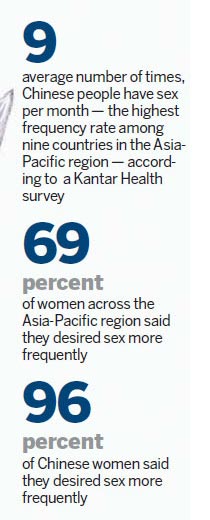Relationships: Sexual pioneers on the march
Fading pleasure

Chen Song, 52, has been bothered by his wife's dour attitude toward sex for decades. "She sticks to one position - missionary - which satisfied me when I was in my 20s and new to sex, but in the 30 years we've been together she's refused to change or experiment. The pleasure has gradually faded. Now, we only have sex once a month, sometimes less," he said.
Chen said his wife's attitude is typical of Chinese women that she feels ashamed to be open and aggressive in sexual matters, Additionally, after having a baby - the most important life task for many Chinese women - her interest in sex waned dramatically.
While awareness of the importance of a good sex life is growing among many well-educated, financially independent women, there are still plenty who regard it as a matter of "opening their legs and delivering a boy", according to Ma.
In May, Tong Songzhen, a sex therapist from Taiwan, was invited to run a sexual therapy center at a hospital in Wuhan, Hubei province. In Tong's experience, many Chinese women are reluctant to discuss sexual matters unless circumstances force them to confront the issue.
"Women are unlikely to turn to sex therapy unless their poor sex life has resulted in other problems," she said.
Most of Tong's patients complained about functional problems, such as premature ejaculation or vaginismus, a condition that affects the ability to engage in vaginal penetration, and sought her advice because the problems had resulted in what they believed to be infertility.
"But nearly 90 percent were not physically ill; their problems were psychological," she said. "Many women feel too ashamed to learn about sex from the elder generation and there's also a lack of communication between couples," she said. "Most of those couples see sex as a 'mechanical movement', rather than a skilled, joyful experience."
Both Tong and Ma have counseled couples that had never had successful intercourse, sometimes even five or six years into their marriages. Some didn't know the basic mechanics of the act, while others had psychological blocks.
Tong once asked a woman who had been married for five years but had never had sexual intercourse to touch her husband's genitals. "Can you imagine? She threw up," she said. In Tong's experience, couples in Taiwan turn to sex therapists or consultants as a last resort before filing for divorce, "but many couples on the Chinese mainland ask doctors to solve sexual problems that have already eaten away at the emotional bond between them", she said.
Faking it
"My husband can't satisfy me sexually, what shall I do?" "I pretend to orgasm every time I have sex with my boyfriend. What's the problem?" Questions such as this appear regularly on Chinese online forums, including Douban and Tianya.
In a survey conducted for a Chinese women's magazine in 2012, 50 percent of the 100,000 respondents felt their partners occasionally coerced them into sexual activity, even when they were unwilling, and nearly 60 percent admitted that they faked orgasm.
"Many Chinese women have questions or even problems in their sex lives. An increasing number want to make changes but find it difficult to learn how to do so because sex therapists and consultants aren't officially recognized on the Chinese mainland, except for a very small number who studied and gained certificates overseas," said Ma Xiaonian, vice-chair of the China Sexology Association.
Obstetricians and gynecologists in China are only responsible for the physical health of their patients, and the treatment of psychosexual problems can take a long time because the doctors and patients need to establish a bond of trust. In addition, it's almost impossible for psychologists who aren't trained in psychosexual matters to offer effective therapy, according to Ma Xiaonian.
|
 |
 |
















